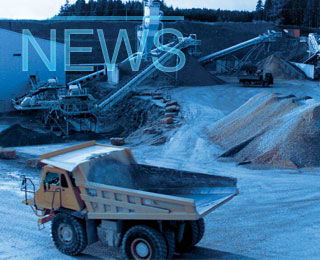Lafarge has marked its 10th year of sustainability reporting in the UK this week with the release of its 2011/2012 Sustainability Reports.
With a commitment to sustainability remaining at the heart of the business, Lafarge has made significant investment in developing its sustainable credentials. This has paid dividends, particularly with waste and water consumption being cut by 92 per cent and 88 per cent respectively in the cement business, since reporting began in 2001.
The latest Reports also show major advances in the reduction of emissions to air, an increase in the amount of material being moved by rail, greater bio-diversity in its landholdings and improvements in health and safety performance.
Dyfrig James, President, Lafarge UK, comments: “Despite the economic downturn, and challenging conditions in the construction market in recent years, we have continued to invest in, and demonstrate our commitment to sustainability across our UK businesses. We’re proud to publish our latest Sustainability Reports for Cement and Aggregates & Concrete today, which show the great strides we have made.”
Key highlights
Key highlights of the 2011 Sustainability Report for Lafarge Cement (which covers the period 2009 - 2011 inclusive) in the UK include:
• 17 per cent reduction in CO2 emissions through increased usage of sustainable waste-derived fuels such as waste tyres and Solid Recovered Fuel (SRF) in manufacturing processes
• 17 per cent reduction in the use of electricity driven by the implementation of Lafarge Cement’s ‘Golden Rules of Energy Management’ to help sites reduce power use
• 26 per cent cut in emissions to air in 2011
• Major reductions in waste production with 76 per cent of all non-hazardous waste sent off site now being recycled
• Declines in fuel consumption with 78 per cent of the road fleet now fitted with new generation, modern, fuel efficient engines, delivering a seven per cent improvement on the fleet’s average road miles per gallon
• Progression in the regeneration of landholdings including granted approval for the creation of a mixed-use community including 500 new homes at the former Northfleet Works
• Significant improvements in health and safety performance, including a 31 per cent decline in first aid instances in 2011, and Cookstown Works achieving a global record of 10 years with no Lost-Time Incidents (LTIs)
• Piloting of independent water footprint assessments at a number of plants, to identify ways to increase efficiency of water use
• Winning the Environment Agency Water Save Award for the Cauldon Shale Lake Project – the creation of a closed loop water system to recirculate water for gas conditioning and industrial cooling at Cauldon Works
• Growth in sales of lower CO2 packed cements from 51 per cent in 2009 to 54 per cent in 2011.
